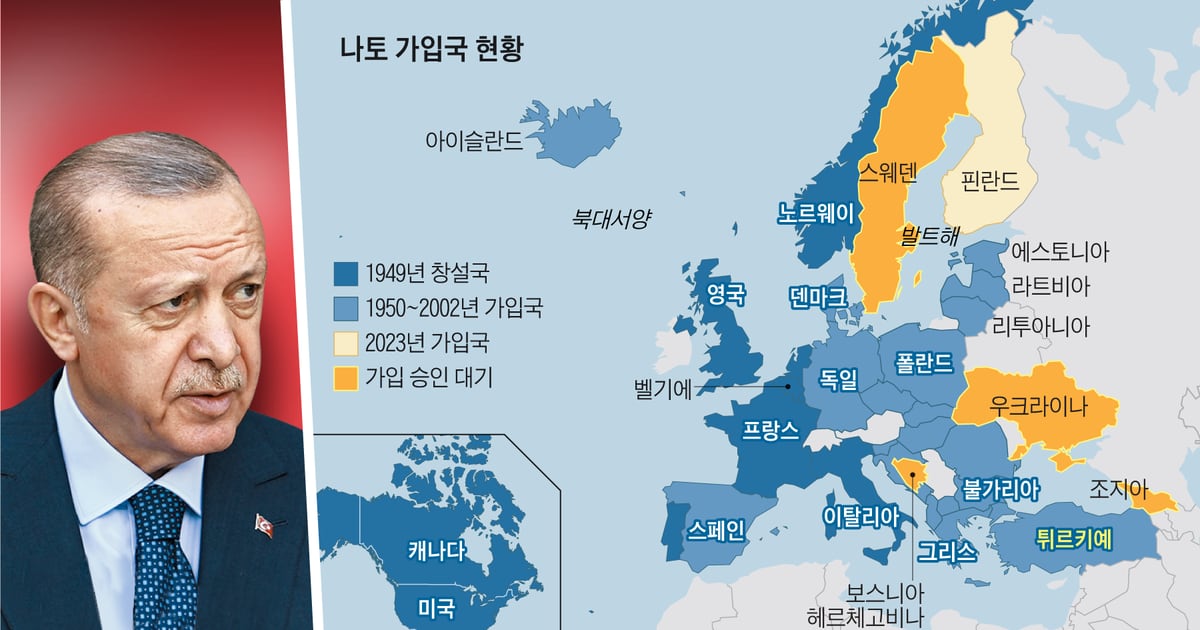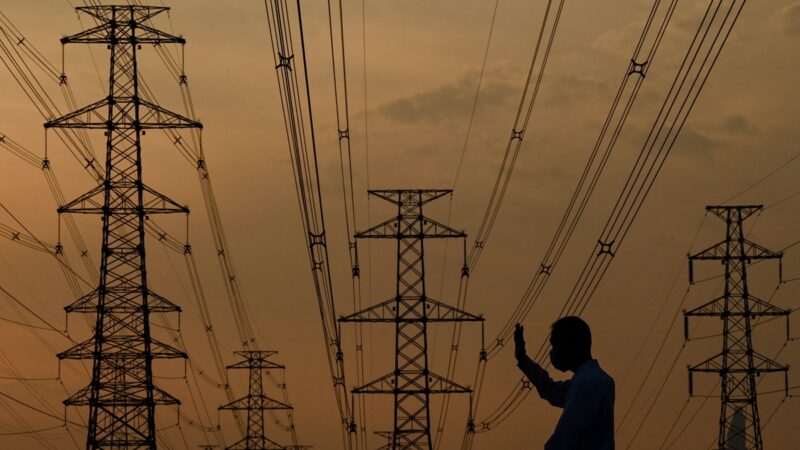The protagonist of last week’s NATO summit in Lithuania was, without a doubt, Turkish President Erdogan. This is because he had been opposed to Sweden’s NATO membership all along, but suddenly accepted it. Member countries, including the United States, were surprised and delighted. Hoaxers say that Erdogan suddenly turned his back on Putin and hugged Biden.
It was different even until early July. How many times has Erdogan attacked Sweden, which protects anti-Turkish Kurds? It was the car that the protests of the Muslim world continued due to the burning of the Koran by the far-right sect in Sweden. Although Erdogan allowed Finland to join NATO, he did not break his insistence that it would not be as good as Sweden. In the midst of this he suddenly changed his position. What were you thinking when you made such a sudden change?
Graphics = Hakyung Kim Graphics = Hakyung Kim
First of all, the economic crisis was serious. It was imperative to restore the pro-Western route. Last year inflation was close to 80%. The value of the lira has fallen to its lowest level ever, and life is being devastated from the poor, who are traditional supporters of Erdogan. The economy is bogged down by interest rate cuts and fiscal expansion populism ahead of the election. Warnings are continuing that if we do not normalize now, we will fall into an uncontrollable crisis. It is a situation where Korea needs to overcome the crisis through economic cooperation with the US and Europe. After the summit, news of the liberalization of visas for Turkish citizens to Europe and the expansion of a free trade agreement with the European Union were reported.
Second, I couldn’t help but care about the domestic political landscape. Public sentiment revealed in the presidential election in May was not easy. Erdogan has won. The majority of opinion polls predicted the victory of the opposition candidate. In the final vote, it won 52:48, but almost half of the people opposed it. It was completely different from the atmosphere of the 2018 presidential election, which won a landslide victory. It was because of the economic crisis and earthquake response theory, but it is also related to the national policy line. In particular, urban and coastal constituencies support a pro-European line with opposition tendencies. Public opinion is gradually leaning in this direction. In exchange for allowing Sweden to join NATO, Erdogan was promised a reward in exchange for accelerating his accession to the European Union. In addition to the traditional supporters, the will to secure political stability by appeasing the opposition is now read.
Third, the geopolitical situation in the Middle East is also a variable. It was Erdogan who had been implementing the so-called eastward policy, focusing on the Middle East rather than Europe. On March 10, with the normalization of diplomatic relations between Saudi Arabia and Iran, a change in the regional perception is taking place. It was Turkey that dreamed of a triangular balance of power, taking advantage of the gap in the conflict between Saudi Arabia and Iran. In fact, it has been gradually expanding its military involvement in the Middle East in cooperation with Qatar, and has been showing its presence in conflict areas such as Syria and Libya. However, due to the intensifying US-China competition in the Middle East and the sudden Middle East détente, Turkey’s room for maneuver is narrowing. As a result, it seems to be playing with the traditional European diplomatic route again.
Fourth, the US variable. Biden, who had a meeting with Erdogan at this summit, evaluated it as a ‘historic meeting’. It was a rough relationship just a couple of months ago. During the Turkish presidential election, the general consensus was that the White House deep down hoped that Erdogan would lose the election. Erdogan, who is an ally but does not participate in sanctions against Russia and rather communicates closely with Moscow, could not be comfortable. Human rights issues were also difficult. However, at this meeting, Erdogan reaffirmed US security support. It is expected to be provided with modernization upgrade kits for 80 existing aircraft, including F16 fighters. The United States, which was worried about the sudden move of Saudi Arabia and Israel, was pleased with it. It is a pretty attractive achievement for Biden, who is worried about the lack of clear diplomatic achievements ahead of next year’s election. Erdogan played a game of profiting from the United States by playing the Swedish cards. Russia’s Putin, who has been giving credit to Erdogan, will feel like he’s been beaten.
Erdogan gained a lot from this NATO summit. He was able to dilute domestic opposition by obtaining a green light to join the European Union. He opened the door to overcome the economic crisis, and the United States’ security support was also tangible. As he stubbornly endured, when NATO’s desperation increased, he snatched it and took advantage of Sweden’s accession as leverage. Of course, there are also sarcastic remarks that it quickly changed sides opportunistically as the war situation unfavorable to Russia gradually emerged.
Erdogan’s transformation leaves a lasting impression. In other words, the value of Islam, which has been promoted as a state policy, is eventually pushed back in front of the national interest. Erdogan’s decision to accept Sweden despite the Koran incineration controversy is both unfamiliar and natural. It shows that ideology and values can be sub-units if necessary in the face of national interest. So is the United States. Despite the controversy over authoritarian behavior and human rights suppression, Biden held Erdogan’s hand. It is because of the urgency of embracing middle ground countries to win the fight against the status quo changers led by China and Russia. This is why the United States is focusing its efforts on Saudi Arabia again.
Opinions are divided about the future of Turkiye. Some analyze that Erdogan has returned to the arms of the West. Considering the internal and external environment and economic situation, Turkiye focuses on the evaluation that it will have to cooperate with the United States and Europe in the future. On the other hand, some liken Erdoğan’s move to a ballet pirouette (a movement that rotates like a top around one leg as a central axis). Unlike a pivot in which one foot is used as an axis and the other foot is strategically moved after fierce calculation, it means that the position is constantly changed. We cannot just criticize the attitude of reaping profits by responding to the situation. Flexibility is definitely a beneficial virtue. However, frequent stance changes also undermine trust. You can win in short fights, but make ultimate victory difficult. What choice will Erdogan make in the future?
#spinning #top.. #Erdogan #biggest #beneficiary #NATO
2023-07-16 18:05:41


